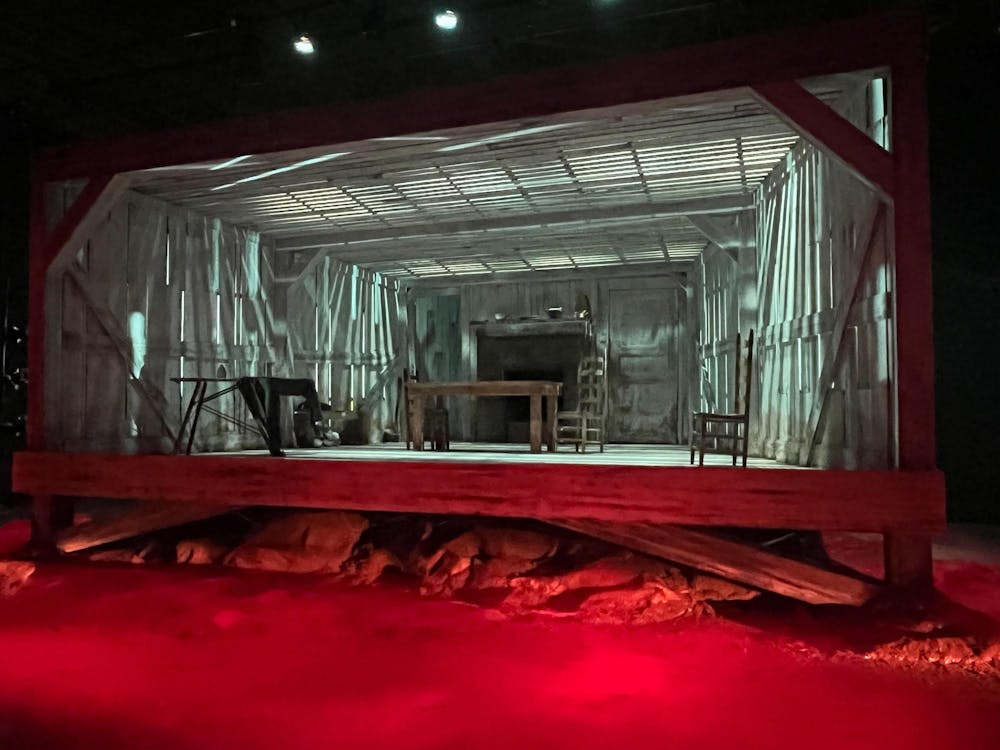Even before I watched it, “Mud” (2001) didn’t seem to be a lighthearted play. Theater Emory’s flier for the play, which will run through Oct. 12 at the Mary Gray Munroe Theater, shows a pair of pale, broken, marble feet sinking into the dry soil. Somehow, the flier still underestimates the despair, pain and reflection that the play brought to the audience.
Inside the theater, which is located in the Alumni Memorial University Center, the stage is a gigantic wooden box, illuminated by eerie green light. The play begins with an unordinary sense of bluntness. Protagonist Mae has her hair half tied and face muddy, ironing clothes mechanically in the left corner of the stage. In contrast, Lloyd isn’t busy – he sits somewhat anxiously on a broken wooden chair wearing torn pants. Their only connection seems to be their muddy feet and shared wooden cabin.
Kailey Albus (25C) plays Mae, a woman trying to leave her current life wedded to an illiterate, sick man Lloyd played by Ethan Cohen (25B). Mae’s yearning for change leads her to fall in love with Henry, who is portrayed by professional actor Joshua Williams.
The play brutally refuses to make the context of the play clear entirely to the audience. The director and playwright never choose to disclose when and where this story occurred, how Lloyd and Mae ended up in poverty or what disease Lloyd carried.
The story plays out in an unreasonably empty, dirty cabin, with Lloyd laughing at Mae for her determination to change her life through education. Yet, he didn’t seem to be interested in Mae’s answers, instead making crude references to sex. Lloyd’s shameless explicitness makes the dialogue jarring. People in the audience gasped. But both the actors portrayed their characters truthfully. Lloyd keeps twitching, jumping at the smallest sound that Mae makes; Mae speaks every word with anger and determination, drawing a stark contrast with the simplistic stage design of a cabin.
On her way to change her life, Mae seems to find hope in Henry, a plump literate man in a suit and tie. The audience can discern Henry’s deceptive decency immediately, as he has trouble reading a medical prescription despite being literate, but to Mae, his words sound like a blessing.
Despite the play’s theme of education, specifically learning the English language, the lines are sparse in content, making the audience interpret its intentional vagueness. For instance, the audience never figures out the relationship between Mae and Lloyd — whether they are married, sexually attracted to each other, friends or family. It was exactly because of Mae’s illiteracy that she isn’t able to understand her situation with Lloyd: she doesn’t have the concepts of love, social bonds. This fracture of memory conveys a historical characteristic of the play, explaining why the plot seemed to come out of nowhere as such misery of humans still happens every day and can happen anywhere, anytime. The actors also portray these confusing lines with an extraordinary amount of emotional strength, helping the audience develop their own connections to the story.
Ultimately, Henry similarly shatters Mae’s hope. Both actors depict the hysteria resulting from social oppression accurately. As Lloyd recovers from his sickness, Henry grows old and paralyzed. Lloyd jumps from corner to corner on the stage, showing off his youthfulness to laugh at Henry while also trying to win Mae’s heart back; Henry fakes a broken leg to stay in Mae and Lloyd’s house rent-free. As Mae finally realizes that she needs to run away from both men, it is too late. The three of them end up in a silent misery with no solutions.
An interesting theatrical choice by Director Mary Lynn Owen was that at each outbreak of the characters’ emotions, the actors freeze their movements and the normal warm lighting changes into a blue overhead light, inviting the audience to process the overwhelming emotions that the play elicited.
The three actors bowed briefly as the play ended while the audience sat quietly from the shocking nature of the play. Due to the dramatic, almost hyperbolic, costume and stage design depicting the character’s poverty, I began the play expecting an uplifting change for Mae.
However, the story stifled every hopeful expectation, unveiling humanity’s ugliness. Mae’s hope is fragile in the face of the patriarchy and the social system that had been “sucking [her] blood,” as the character said in the end. Theater Emory’s “Mud,” with its unique theatrical choices of costume and lighting, accentuates this despair of humans in the suffocating system.








